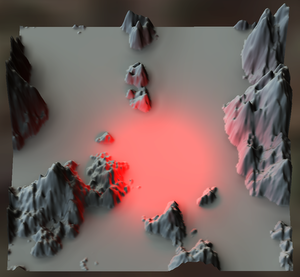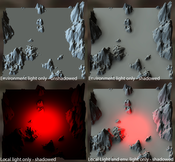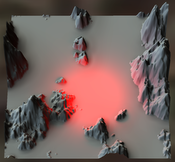Information
- Publication Type: Master Thesis
- Workgroup(s)/Project(s):
- Date: May 2013
- Date (Start): 18. February 2009
- TU Wien Library:
- First Supervisor:
- Keywords: Spherical Harmonics, Height Fields, Indirect Illumination
Abstract
This thesis presents a method to compute soft shadows from environment maps and local light sources on dynamic height fields, extending the work of Snyder et al. [29]. While direct illumination in static scenes is very common in video games and 3D applications, real-time global illumination methods supporting dynamic scenes and lights are still an active field of research.In this work, a short general introduction to global illumination and spherical harmonics is presented as well as an overview of the state of the art methods in interactive global illumination for height fields.
In our method, visibility at each receiver point of a height field is determined by the visible horizon, which can be approximated efficiently using a multi-resolution sampling approach. Local light sources are represented by spherical lights and the incident radiance at receiver points is projected into the spherical harmonic basis. Hence, this method produces convincing shadows on dynamic height fields more efficiently than global illumination methods for general geometry.
Additional Files and Images
Weblinks
No further information available.BibTeX
@mastersthesis{MeierStauffer-2013-iihf,
title = "Realistic Local Lighting in Dynamic Height Fields",
author = "Aaron Meier-Stauffer",
year = "2013",
abstract = "This thesis presents a method to compute soft shadows from
environment maps and local light sources on dynamic height
fields, extending the work of Snyder et al. [29]. While
direct illumination in static scenes is very common in video
games and 3D applications, real-time global illumination
methods supporting dynamic scenes and lights are still an
active field of research. In this work, a short general
introduction to global illumination and spherical harmonics
is presented as well as an overview of the state of the art
methods in interactive global illumination for height
fields. In our method, visibility at each receiver point of
a height field is determined by the visible horizon, which
can be approximated efficiently using a multi-resolution
sampling approach. Local light sources are represented by
spherical lights and the incident radiance at receiver
points is projected into the spherical harmonic basis.
Hence, this method produces convincing shadows on dynamic
height fields more efficiently than global illumination
methods for general geometry.",
month = may,
address = "Favoritenstrasse 9-11/E193-02, A-1040 Vienna, Austria",
school = "Institute of Computer Graphics and Algorithms, Vienna
University of Technology ",
keywords = "Spherical Harmonics, Height Fields, Indirect Illumination",
URL = "https://www.cg.tuwien.ac.at/research/publications/2013/MeierStauffer-2013-iihf/",
}

 poster
poster thesis
thesis



